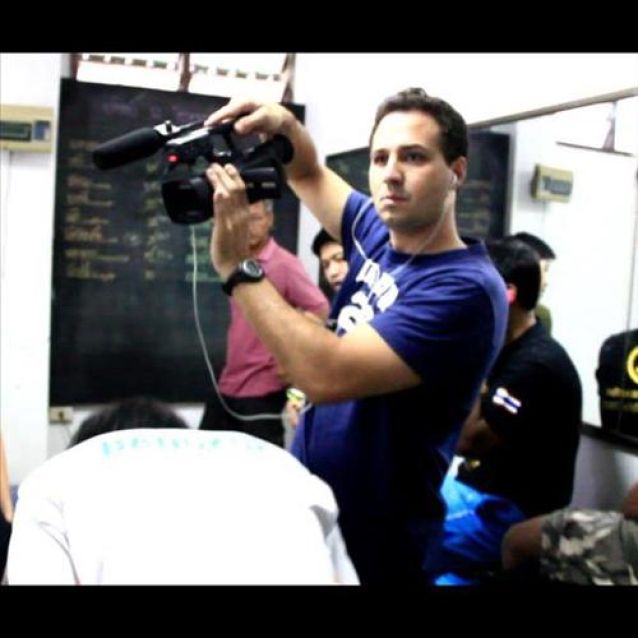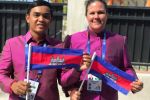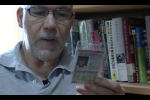(Yonhap Interview) American shoots documentary on S. Korean baseball to educate fans, self
Posted by Philip Riccobono at 10 October, at 14 : 58 PM Print

SEOUL, Oct. 2 (Yonhap) — By day, Philip Riccobono teaches English at a university in Daejeon, some 160 kilometers south of Seoul, helping his young students with a second language.
When he’s not in classrooms, the New York native throws himself into a project that he hopes will educate Major League Baseball (MLB) fans about South Korean style of baseball — not with lectures but with a documentary film.
Riccobono, 41, arrived in South Korea on Aug. 28. The very next day, he packed his camcorder and tripods and, in his own words, “hit the ground running.” Riccobono found himself in the stands of Hanbat Baseball Stadium in Daejeon, home of the Hanwha Eagles of the Korea Baseball Organization (KBO), the country’s top competition, filming and interviewing fans.
Riccobono flew in from Thailand, where he and his co-director, Atttarut Vathagavoraku, shot a documentary titled “Emma, Muay Thai Girl,” about a Muay Thai fighter from England, Emma Thomas. In the U.S., Riccobono, who holds a bachelor’s degree in journalism and a master’s in education, also worked in television, doing research and providing statistics for such esteemed baseball play-by-play announcers as Joe Buck for Fox and Bob Costas for NBC in the late 1980s.
 |
|
Philip Riccobono shoots a scene in his earlier documentary about an English Muay Thai boxer in Thailand. (photo courtesy of Philip Riccobono)
|
As “Emma, Muay Thai Girl” goes through post-production, Riccobono wasted little time in launching his second project — this time, on South Korean professional baseball or, more specifically, cheering culture in Korean baseball.
In an interview with Yonhap News Agency at Jamsil Stadium in Seoul last Friday, Riccobono, who said he grew up a fan of the New York Yankees, said he only had a vague idea of what to expect from the KBO.
“Honestly, I didn’t know that much about the league,” he said. “I lived in Japan for a year, and I took in baseball there. I figured it was going to be somewhat like that here.”
The KBO and the Nippon Professional Baseball (NPB) share parts of their cheering culture, such as fans’ rhythmic, if somewhat mechanical, clapping and chanting in unison. Riccobono, who lived in Japan in 2002, said Korean fans were more organized than Japanese, and described how fans here are, with every pitch, “on the edge of their seats like it’s the World Series.”
“I wanted to show the world, especially MLB fans, what they’re missing out on,” Riccobono said. “It’s a completely different experience.”
Riccobono has tentatively titled his new documentary “Cheering in Korea,” and has opened a Facebook page (http://www.facebook.com/#!/pages/Cheering-in-Korea-an-upcoming-documentary/268041059965632?fref=ts) called “Cheering in Korea (an upcoming documentary),” in hopes of finding more fans to interview and gathering new opinions.
As he eyes a release next year, Riccobono said his documentary will also appeal to fans of sports other than baseball because “they’d appreciate seeing what it’s like to go to this particular type of game.”
In both MLB and KBO games, hitters for the home team enter the batter’s box to their own entrance music. Cheers for the most part are muted during an at-bat in MLB, unless the batter for the home team represents a go-ahead run with runners on base in late innings. Most teams don’t have cheerleaders directing the crowd.
 |
|
Philip Riccobono (R) speaks to Ben Jukich of the LG Twins on Sept. 28, 2012, in Seoul. (Yonhap)
|
In the KBO, cheering almost never stops and many fans stay on their feet for all nine innings. Whenever their team is at bat, home or away, fans bang ThunderStix, chant the batter’s name and sing the player’s own cheering songs, some of which are sampled from hit singles such as “What’s Up?” by 4 Non Blondes and “We’re Not Gonna Take It” by Twisted Sister. Cheerleaders lead well-choreographed routines of clapping and yelling, as they set themselves on makeshift stages at the bottom of their stands — first base side for home fans and third base for visiting fans.
Riccobono said over his first 30 days, he interviewed about 15 fans. Baseball enthusiasts will remain his focal point.
“I am not even focusing on the field or the different styles of play,” he said. “It’s mostly about the fans, about finding interesting fans that stick out. They’re part of culture and fabric of every ballpark.”
Riccobono’s goal is to visit each one of the seven KBO stadiums, because he doesn’t want “any stone unturned in terms of finding the most interesting fans.” Eight teams compete in the league, and two Seoul clubs, the Doosan Bears and the LG Twins, share Jamsil as their home.
Riccobono also hopes to interview as many foreign players in the KBO as he can. Each team is permitted to carry two non-Koreans. Last Friday, Riccobono filmed his conversation with Ben Jukich, an American left-handed pitcher for the Twins, for his first player interview.
In an incident that highlighted challenges ahead for Riccobono, however, their interview was cut short by the Twins’ officials, because Riccobono had directly contacted Jukich on his own, instead of through the team’s public relations department. There was yet another problem.
Riccobono, without any accreditation, managed to walk past three burly security guards through the entrance for media and players to meet Jukich near the dugout, his camcorder and other pieces of filming equipment apparently giving off an impression of someone who belonged inside. After one of the guards was admonished, Riccobono, in his own expression, was “just shy of getting escorted out” of the restricted area.
“Getting interviews with (foreign) players is going to be the hardest part,” he said. “It’s taken a while to break through with no contacts (in the KBO).”
Nonetheless, Riccobono said he tries to take it all in stride.
“The best part (about this project) is just being out there in the ballpark,” he said. “I feel like I am in my element.”
As he tries to teach his audience about the new culture, Riccobono said he has learned a great deal himself.
“I feel so natural going around, talking to people, interviewing them, getting footage, and learning about the new baseball culture in the stands,” he said. “I feel like I am learning a new brand of baseball. It’s my journey, and it’s also an education process.”
By Yoo Jee-ho, take from http://english.yonhapnews.co.kr/n_interview/2012/10/02/65/4801000000AEN20121002000500315F.HTML
jeeho@yna.co.kr
(END)
Related Posts
-

17 November at 11 : 40 AM 0
Chris Chapman: Las Vegas Sports Radio Personality
-

28 October at 12 : 37 PM 0
Women in baseball: Cambodia's national team coach rescues young human trafficking victims
-

31 May at 11 : 30 AM 4
Podcast 3.1: Paul Tanner #Japan #basballcards
-

26 November at 17 : 17 PM 0
Podcast 2.5: #Yonhap @Jeeho_1 lends a hand to @JoeyJung42






